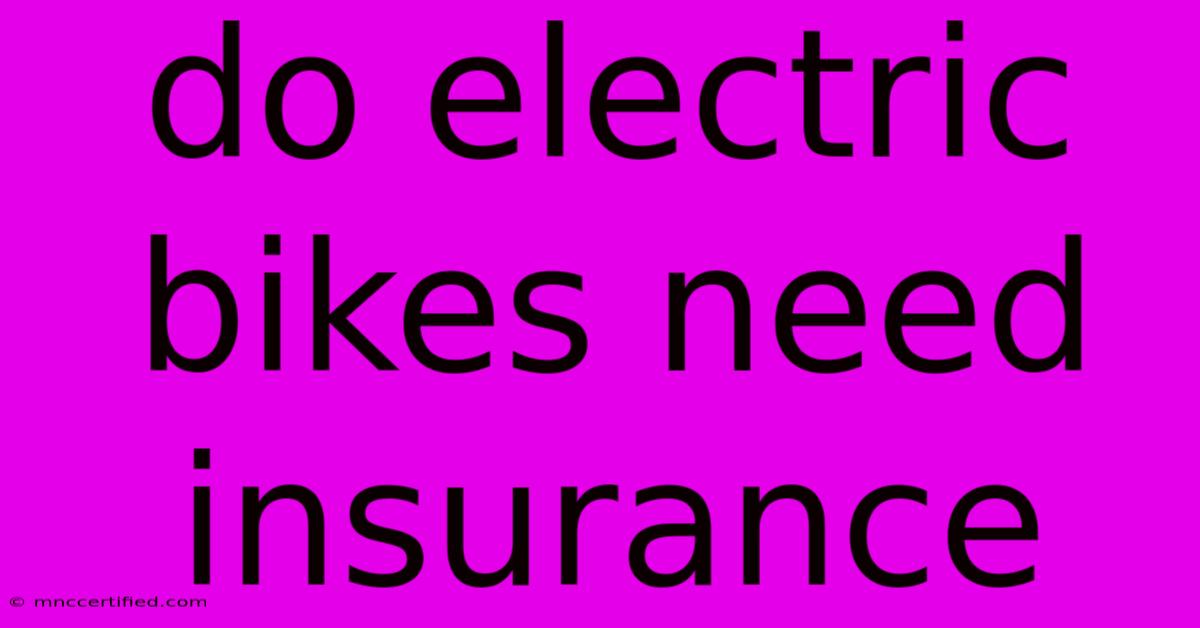Do Electric Bikes Need Insurance

Table of Contents
Do Electric Bikes Need Insurance? A Comprehensive Guide
The rise of e-bikes has brought a wave of convenience and eco-friendliness, but with this new mode of transportation comes a new set of questions, particularly regarding insurance. Do electric bikes need insurance? The short answer is: it depends. There's no single, universal answer, as regulations vary significantly by location and the specifics of your situation. This comprehensive guide will break down everything you need to know.
Legal Requirements: A Patchwork of Regulations
Unlike cars, there's no nationwide mandate in most countries requiring insurance for e-bikes. This means the answer hinges heavily on your location. Some regions treat e-bikes like bicycles, requiring no insurance. Others classify them closer to mopeds or motorcycles, demanding insurance coverage.
Checking Your Local Laws: The Crucial First Step
Before you even think about riding your e-bike, you must research your local laws. This includes:
- Your city or municipality: Regulations can be surprisingly granular, differing even between neighboring towns.
- Your state or province: State-level laws often set the broader framework, which local jurisdictions can then modify.
- Your country: National laws provide the overarching legal landscape.
You can typically find this information on your local government's website, through a search for "[your location] e-bike insurance laws," or by contacting your local Department of Motor Vehicles (DMV) or equivalent agency.
Factors Influencing Insurance Requirements
Even within a single jurisdiction, several factors can determine whether insurance is required:
- E-bike classification: Laws often categorize e-bikes based on their speed, motor power, and pedal assist features. A slower, pedal-assist e-bike might be exempt, while a high-speed throttle-only model might require insurance.
- Road use: Riding your e-bike on specific roads or highways might trigger insurance requirements that don't apply to using it on bike paths or private property.
- Age restrictions: Some jurisdictions have age restrictions for operating certain types of e-bikes, and insurance requirements may tie into these age limits.
Beyond Legal Requirements: The Case for Insurance
Even if your area doesn't mandate e-bike insurance, strongly consider obtaining it. Here's why:
Protecting Yourself Financially
E-bike accidents can be costly. Insurance can cover:
- Medical expenses: Injuries sustained in an accident can lead to significant medical bills.
- Property damage: Damaging another person's property (a car, a fence, etc.) can incur substantial repair costs.
- Legal fees: If you are involved in a lawsuit, legal representation can be very expensive.
- Repair or replacement of your e-bike: Comprehensive insurance policies can also help cover the cost of repairing or replacing your e-bike if it's damaged.
Peace of Mind
Knowing you're protected financially can provide invaluable peace of mind while riding. This is especially important if you regularly use your e-bike for commuting or other essential trips.
Types of Insurance Coverage
Several insurance options might cover your e-bike, depending on your needs and your existing policies:
- Homeowners or renters insurance: Some policies may extend limited liability coverage to e-bikes, but this coverage is often minimal.
- Umbrella liability insurance: This supplemental policy provides additional liability coverage beyond what's offered by other policies.
- Specialized e-bike insurance: Some insurance companies now offer policies specifically designed for e-bikes, offering broader and more tailored coverage.
It's crucial to review your existing insurance policies carefully and contact your insurer to determine the extent of your e-bike coverage.
Choosing the Right E-bike Insurance (If Needed)
If you decide to purchase e-bike insurance, consider these factors:
- Coverage limits: Ensure the policy offers sufficient coverage for potential liability and damages.
- Premiums: Compare premiums from different insurers to find the best value.
- Deductibles: Understand the deductible amount you'll have to pay before the insurance kicks in.
- Exclusions: Pay close attention to any exclusions in the policy, such as coverage for specific types of accidents or locations.
Conclusion: Know Your Local Laws, Protect Yourself
The question of whether e-bikes need insurance is not straightforward. Diligent research into your local regulations is paramount. However, even in areas where insurance isn't mandatory, the financial and personal protection it provides make it a wise investment for many e-bike owners. Prioritize safety, understand your local laws, and choose insurance coverage that aligns with your individual needs and riding habits.

Thank you for visiting our website wich cover about Do Electric Bikes Need Insurance. We hope the information provided has been useful to you. Feel free to contact us if you have any questions or need further assistance. See you next time and dont miss to bookmark.
Featured Posts
-
Alex Burghart A Commons Presence
Nov 21, 2024
-
Burghart Defeats Labour On Farm Tax At Pmqs
Nov 21, 2024
-
Motor Trade Insurance Birmingham
Nov 21, 2024
-
Bear River Insurance Riverton Ut
Nov 21, 2024
-
John Prescott Former Uk Deputy Pm Dies At 86
Nov 21, 2024